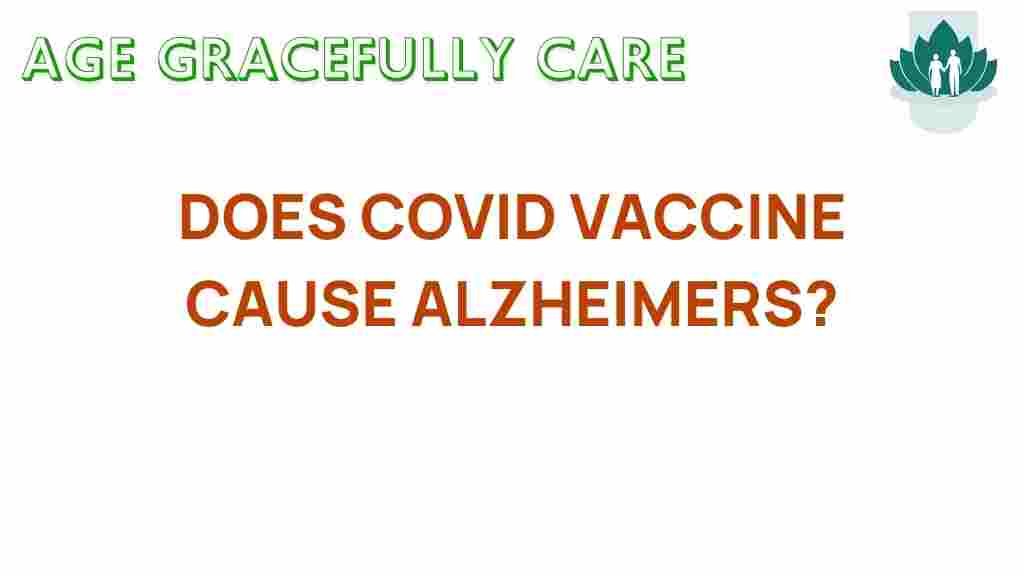Unpacking the Controversy: Does the COVID Vaccine Trigger Alzheimer’s?
The COVID-19 pandemic has brought about significant changes in public health, safety, and perceptions of vaccines. Among the myriad discussions surrounding vaccine safety, one of the most contentious topics has been whether the COVID vaccine could potentially trigger Alzheimer’s disease. This article aims to unpack this controversy, focusing on the various health concerns related to the COVID vaccine, its neurological effects, and the overall public perception regarding vaccine safety.
Understanding the COVID Vaccine and Its Role in Immunity
The COVID vaccine has been a pivotal tool in fighting the pandemic, providing immunity against the SARS-CoV-2 virus. Vaccination works by stimulating the immune system to recognize and combat pathogens. The vaccines currently available have undergone rigorous testing to ensure their safety and efficacy. However, as with any medical intervention, some individuals express concerns regarding potential side effects.
The Intersection of Aging and Alzheimer’s
Alzheimer’s disease is a progressive neurological disorder that primarily affects older adults. As people age, the risk of developing Alzheimer’s increases. Understanding how factors such as aging and vaccination intersect is crucial for public health discussions.
Exploring Health Concerns Around the COVID Vaccine
Health concerns regarding the COVID vaccine have emerged from various sources, leading to widespread discussion and debate. Some of these concerns include:
- Neurological Effects: There have been anecdotal reports and studies looking into the neurological effects of vaccines, including the COVID vaccine.
- Public Perception: Misinformation and fear surrounding vaccines can influence public perception and vaccine uptake.
- Research Findings: Ongoing research seeks to clarify the relationship between vaccines and neurological disorders.
The Debate: Does the COVID Vaccine Trigger Alzheimer’s?
Current Research Findings
Research into the connection between the COVID vaccine and Alzheimer’s is ongoing. Some studies have examined the possibility of vaccines having long-term neurological effects. However, the consensus in the scientific community is that there is no conclusive evidence linking the COVID vaccine to the onset of Alzheimer’s. Key findings include:
- Most studies indicate that vaccines are safe and effective, with few neurological side effects reported.
- Research has shown that vaccination can actually help protect against severe illness, which could indirectly benefit neurological health.
- Longitudinal studies are needed to fully understand any potential long-term effects of the COVID vaccine.
Neurological Effects: What the Data Shows
While some individuals worry about neurological effects from the COVID vaccine, it’s essential to look at the data critically. Some notable points include:
- A small number of cases reporting neurological issues post-vaccination have been documented, but these are extremely rare.
- Health authorities, including the CDC and WHO, continue to monitor vaccine safety and report findings to ensure public safety.
Public Perception and Vaccine Safety
The public perception of vaccine safety plays a significant role in vaccination rates. Misinformation and fear can lead to hesitancy, impacting immunity against diseases like COVID-19. To combat these issues, health organizations are working to provide accurate information and address concerns related to the COVID vaccine and potential health risks.
Addressing Health Concerns
To address health concerns surrounding the COVID vaccine and Alzheimer’s, consider the following:
- Stay Informed: Keep up with reputable sources like the CDC and WHO.
- Consult Healthcare Providers: Discuss any concerns with a trusted healthcare provider who can provide personalized advice.
- Engage in Community Discussions: Participate in community forums to share information and learn from others.
Step-by-Step Process to Ensure Vaccine Safety
To ensure that you are making an informed decision regarding the COVID vaccine, follow this step-by-step process:
- Research: Look for reliable information about the COVID vaccine and its safety.
- Consult: Speak with your healthcare provider about any health concerns or pre-existing conditions.
- Weigh Risks vs. Benefits: Consider the risks of COVID-19 compared to the potential risks of vaccination.
- Make an Informed Decision: Based on research and consultation, decide whether to get vaccinated.
- Monitor Your Health: After vaccination, monitor your health and report any unusual symptoms to your healthcare provider.
Conclusion: The Importance of Continued Research and Open Dialogue
In conclusion, the question of whether the COVID vaccine triggers Alzheimer’s remains a topic of interest and concern for many. Current research findings suggest that there is no substantial evidence to support a direct link between the COVID vaccine and the onset of Alzheimer’s disease. Instead, the focus should be on the benefits of vaccination in promoting immunity and protecting against severe illness.
As we continue to navigate the complexities of vaccine safety and health concerns, it is vital to engage in open dialogue, rely on reputable sources for information, and support ongoing research. By fostering understanding and addressing fears, we can enhance public perception and encourage higher vaccination rates, ultimately contributing to the health and safety of our communities.
For more information on vaccine safety and ongoing studies, please visit NCBI for access to a wealth of research articles and findings.
This article is in the category Health and created by AgeGracefullyCare Team
